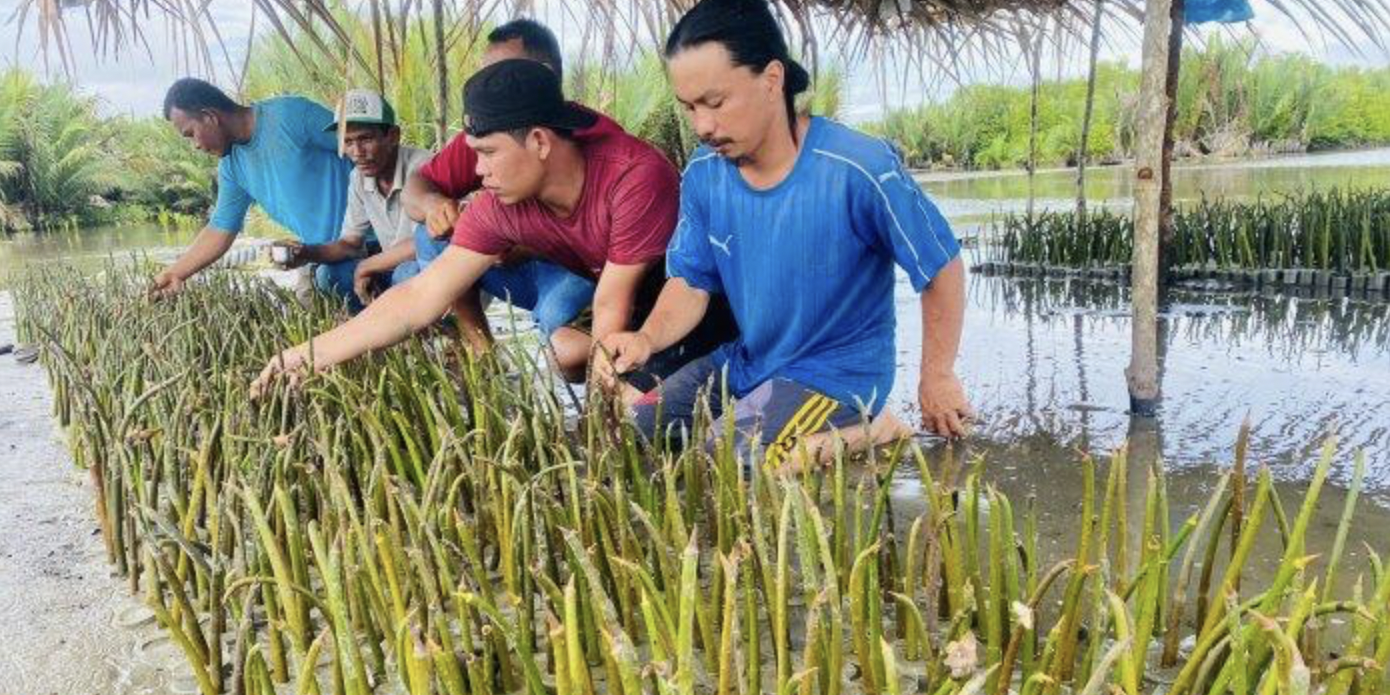Singkil Lama Beach is hot during the day, but the rows of mangrove trees provide shade, especially for the people in the surrounding villages.
The sun penetrates the dense, dry branches of the mangroves, illuminating the various marine life that gather around the roots floating in the brackish water.
Fish flit on each side of the path, surrounded by mangrove foliage.
It takes about 30 minutes to reach the mangrove area at Singkil Lama Beach.
The village is one of the villages that has greatly benefited from the mangroves planted gradually since 2018 by PT Perkebunan Lembah Bhakti (PLB), a subsidiary of PT Astra Agro Lestari Tbk.
In 2018, when Aceh Singkil District experienced rapid development, PT PLB engaged the Aceh Singkil District Environment Office (DLH) to commit to the sustainability of mangrove planting and foster the Teluk Bayu Brackish Forest Farmer Group (KTHPTB).
This farmer group is fostered to manage mangroves, provide farming training, and provide their livelihoods.
Mangrove forests can restore the balance of coastal ecosystems and develop protected areas of marine biota such as fish, crabs, and shellfish. The surrounding community can harvest these for consumption or even sell them for their livelihoods.
Not only that, this mangrove forest also provides opportunities for local residents to utilize it as a weekend tourist spot and for other activities.
Currently, more than 40,000 mangrove stems have grown, and many have even reached a height of more than 4 meters.
The last planting was carried out by PT PLB and DLH in 2023, totaling 5,500 mangrove trees, the benefits of which are felt not only for humans but also for the environment and surrounding biodiversity.
Coinciding with World Biodiversity Day on May 22, 2024, Community Development Area Manager Aceh Riduan Manik echoed the commitment to rehabilitate or continue planting mangroves by providing new mangrove seeds to KTHPTB.
This is an active role of the company towards the development and welfare of the nation, one of which is to recreate the biological function of plants.
“This mangrove planting sustainability program is not only targeting the creation of biological balance but also as an active form of the company that synergizes with government programs, in this case, the Environmental Agency and the local community, namely through coaching to farmer groups,” Riduan explained.
The same thing was conveyed by PT PLB’s Assistant Corporate Social Responsibility (CSR), Chess Wibowo, in commemorating Biodiversity Day he deliberately crossed the beach to visit KTHPTB on Singkil Lama beach.
There, KTHPTB is carrying out activities to manage the area to be rehabilitated, starting with seeding, planting, and maintenance in preparation for further planting, which is planned to be carried out in 2024.
“As has been echoed since seven years ago, one of our goals in planting mangroves on the beach of Singkil Lama is to protect the alternative road in Singkil.”
“Our next plan is to plant another 5,000 mangroves in 2024 to reach the target of 50,000 mangroves until mangrove forests cover the entire alternative road,” said Chess.
In addition to having roots that efficiently protect against soil erosion, mangrove forests can minimize the impact of floods that are prone to hit the coast.
Mangroves also function as abrasion barriers by holding back seawater, preventing land erosion, which can improve coastal conditions. Their greatest strength is their ability to capture and store carbon.
PT PLB is committed to continuing to do business that prioritizes ecosystem balance and maintains harmonization with the community through a public contribution roadmap with various CSR programs based on four main pillars, namely Economy, Health, Education, and Environment.
Source: Aceh.tribunnews.com
Disclaimer
This article may contain copyrighted material, the use of which may not have been pre-authorized by the copyright owner. This material is made available for the purpose of giving information and knowledge. The material contained on the Astra Agro website distributed without profit. If you are interested in using copyrighted material from this material for any reason that goes beyond ‘fair use’, you must first obtain permission from the original source.










